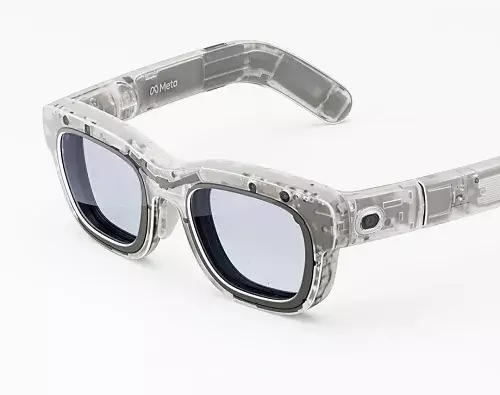Meta, under the visionary leadership of CEO Mark Zuckerberg, is boldly stepping into the realm of augmented reality (AR) with its Orion AR glasses. Although not set for a commercial release until 2027, the slow unveiling of its features suggests that Meta is meticulously refining its approach to revolutionize the way we interact with technology. These glasses represent more than just a piece of hardware; they signify a potential paradigm shift in how we integrate digital experiences into our daily lives.
With the competition heating up, particularly against Apple’s exorbitantly priced VisionPro, which stands at $3,499, Meta aims for a different trajectory—one that entails creating an accessible AR experience reminiscent of your everyday smartphone. The ambitious goal is to produce smart glasses that not only enhance our lives but also fit seamlessly into them without the hefty price tag that may hinder widespread adoption.
Innovative Technology: A Peek at Features
Recent updates from Meta reveal key technological advancements that embody the spirit of innovation driving the Orion AR glasses. The introduction of the “puck,” an external device providing supplemental computing and battery power, is a testament to Meta’s commitment to developing an aesthetically appealing glasses design. By creating a more compact frame, Meta addresses a significant challenge in AR technology—the balance between functionality and wearability.
Despite still bearing a sense of bulkiness, the evolution of these glasses speaks volumes about Meta’s journey in AR development. The goal of making these glasses as fashionable as the Ray-Ban smart glasses will attract users from various demographics, merging technology with lifestyle. This shift could foster a cultural acceptance of wearing smart devices as a norm, rather than an oddity.
AI Integration: The Secret Sauce
One intriguing aspect of the Orion glasses is their anticipated integration of artificial intelligence. The ability to blend AI with AR technology opens up limitless possibilities for enhanced interactivity, making tasks as simple as ordering food or receiving real-time navigation updates more intuitive and engaging. Meta envisions a world where wearing smart glasses can replace the ever-popular smartphone, connecting us to information through a glance rather than a scroll.
The potential for AI to transform ordinary tasks into smart interactions represents a significant leap in how we visualize and engage with our surroundings. Many will welcome the seamless integration of digital enhancements into the physical realm. This focus on usability is not merely a business strategy; it reflects a broader shift in societal adaptation to technology, and Meta appears keen to lead this charge.
Price Strategy: The Battle for Market Share
Navigating the complexities of production costs against the backdrop of fluctuating trade policies presents a formidable challenge for Meta. The company aims to keep its AR glasses budget-friendly, targeting a price point that aligns with modern mobile phones, making it accessible to a wide audience. This strategy diverges sharply from Apple’s model, suggesting that Zuckerberg firmly believes in democratizing technology rather than creating an exclusive luxury item.
In the current climate of economic uncertainty, this decision positions Meta favorably among competitors, potentially enhancing its market share. However, balancing affordability with quality and innovative features will be crucial. The company must ensure that cutting costs does not compromise the user experience, which could otherwise hinder adoption.
Future Prospects: Transforming Daily Life
As Zuckerberg expresses optimism about the future dominance of AR glasses over mobile phones, it becomes essential to consider what this means for consumers. If successful, Orion AR glasses could fundamentally change our interaction with our environment, overlaying digital information onto real-world scenarios effortlessly.
The enthusiasm surrounding this technology is palpable, raising questions about how society will adapt. Will we embrace this new era of connectivity, or will we remain hesitant, tethered to our phones? The success of Orion AR glasses will not only rely on their features but also on Meta’s ability to inspire confidence and excitement in the future of augmented reality.
Meta is not merely developing a product; it is pioneering a movement that could redefine how we perceive and engage with both our digital and physical worlds. As the landscape continues to evolve, the focus remains on innovation, accessibility, and ultimately, the transformative potential that AR technology holds for all of us.


Leave a Reply
You must be logged in to post a comment.